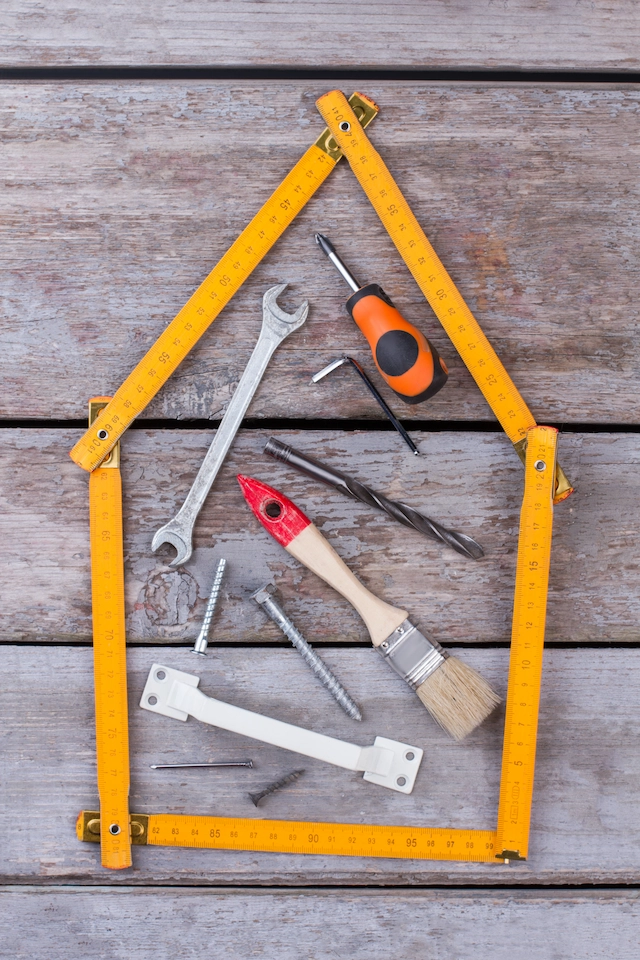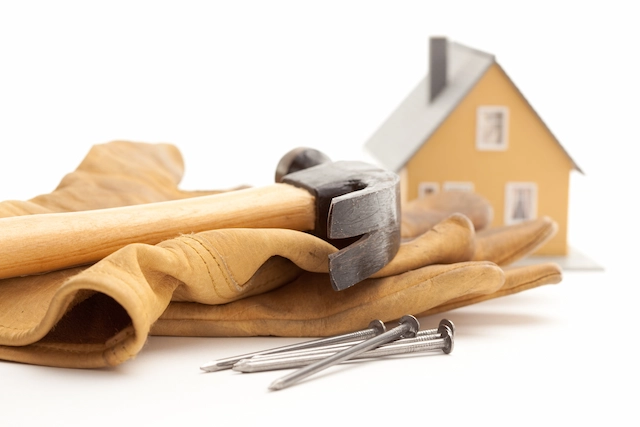When planning a home improvement project, understanding the cost of hiring a contractor is one of the most important steps. The total cost can vary significantly depending on factors like the scope of the project, the materials used, and where you live. In this article, we’ll break down what goes into the cost of hiring a home improvement contractor and provide insights to help you plan and budget for your next renovation.
Factors That Affect the Cost of Hiring a Home Improvement Contractor
- Type of Project
The type of home improvement project you’re undertaking will be one of the largest determinants of cost. A kitchen remodel will generally cost more than installing new flooring, for example, due to the complexity and materials involved. Different types of projects require varying levels of skill, labor, and specialized expertise, which affects the final price. - Size of the Project
The scale of the project also plays a major role in determining cost. A small repair, such as fixing a broken tile, will naturally cost less than adding a new room to your home. Larger renovation projects require more materials, labor, and time, leading to higher overall costs. Contractors will often charge based on the square footage for projects like room additions or flooring installations. - Materials and Finishes
The choice of materials has a significant impact on the overall cost. Low-cost materials like laminate countertops or vinyl flooring will be less expensive than high-end materials like granite countertops or hardwood floors. Additionally, premium finishes like custom cabinetry or designer tiles can quickly increase the cost of a project. Discussing material options with your contractor can help you find a balance between quality and affordability. - Labor Costs
Labor is another key factor that affects the cost of hiring a contractor. Labor rates can vary based on the region, the contractor’s expertise, and the complexity of the work. For instance, labor in urban areas is generally higher than in rural locations. Contractors might charge a flat rate or an hourly rate depending on the project’s size and duration. Be sure to clarify labor costs with your contractor before work begins to avoid surprises. - Permits and Licensing
Many home improvement projects, especially those involving structural changes or electrical and plumbing work, require building permits. These permits are usually an additional cost, which can vary depending on your local authority. Licensed contractors are familiar with the local building codes and regulations, so they can help you secure the necessary permits, but this can add to the overall cost of the project.
Average Costs for Common Home Improvement Projects
- Kitchen Remodel
Kitchen renovations are among the most expensive home improvement projects. On average, a kitchen remodel can cost anywhere between $10,000 and $50,000 or more, depending on the size and complexity of the renovation. Custom cabinetry, high-end appliances, and premium countertops like granite or quartz can drive up the price significantly. - Bathroom Renovation
A full bathroom renovation typically costs between $5,000 and $20,000. This can vary based on the scope of work, whether you’re simply updating fixtures or completely reconfiguring the layout. Tiling, plumbing, and replacing fixtures like toilets, sinks, and showers add to the overall cost, while custom features such as walk-in showers or soaking tubs can increase it further. - Room Additions
Adding an extra room to your home can be one of the costliest home improvement projects. The average cost per square foot for a room addition ranges from $80 to $200, depending on materials, labor, and location. This can translate to a total cost of $20,000 to $60,000 or more, depending on the size of the addition. Factors like foundation work, roofing, and electrical upgrades contribute to the high price tag. - Roofing
Roof replacement costs vary based on the size of your roof and the type of materials used. The national average cost for roof replacement ranges from $5,000 to $15,000. Asphalt shingles are typically the least expensive option, while metal, tile, or slate roofing can be more expensive. - Flooring Installation
The cost of flooring installation depends on the material you choose. Hardwood flooring typically costs between $6 and $12 per square foot, while laminate or vinyl flooring can range from $2 to $7 per square foot. Tile installation is usually more labor-intensive and can range from $10 to $15 per square foot.
Additional Costs to Consider
- Unexpected Repairs or Issues
During a renovation, hidden issues such as water damage, mold, or outdated wiring may be discovered, leading to additional costs. It’s a good idea to set aside at least 10-20% of your budget for unforeseen expenses. - Demolition and Cleanup
If your project involves tearing down old structures or removing debris, contractors may charge additional fees for demolition and disposal. Be sure to ask whether demolition and cleanup are included in the contractor’s initial estimate. - Warranties and After-Project Support
Some contractors offer warranties on their workmanship and the materials used. This can be an added cost, but it provides peace of mind knowing that any issues that arise after the project will be covered. Ask about the length and terms of any warranties provided.
Ways to Save on Home Improvement Costs
- Get Multiple Bids
One of the best ways to save money is to get multiple bids from different contractors. This will give you a better sense of the market rate for your project. Be sure to compare the scope of work and materials offered, not just the price. - Use Standard Materials
Opting for mid-range or standard materials instead of luxury finishes can save you a considerable amount of money. Discuss your budget with the contractor and look for cost-effective options that still meet your needs. - Time Your Project
If possible, schedule your renovation during the off-peak season when contractors may offer discounts due to reduced demand. Winter and late fall are often slower periods for home improvement projects. - DIY Where Possible
While it’s essential to hire a contractor for complex or dangerous tasks, there may be smaller jobs that you can handle yourself, such as painting or removing old fixtures. This can reduce labor costs and keep the project on budget.
Conclusion
The cost of hiring a home improvement contractor can vary widely depending on the type and scale of the project, the materials used, labor rates, and regional factors. On average, home improvement projects like kitchen remodels, bathroom renovations, and room additions can range from several thousand to tens of thousands of dollars. To keep costs under control, it’s important to get multiple bids, use standard materials, and set aside extra funds for unexpected issues.
By understanding the factors that influence contractor pricing and planning accordingly, you can successfully budget for your home improvement project and achieve the desired results without breaking the bank.
Staten Island, NY Home Improvement Contractor – Platinum Renovation Services
Looking for a reliable home improvement contractor in Staten Island, NY? Look no further than Platinum Renovation Services! Whether you’re planning a kitchen remodel, bathroom renovation, or a room addition, our experienced and licensed contractors deliver top-quality workmanship that adheres to local building codes and meets your budget. From small repairs to larger renovation projects, we ensure every detail is handled with care. Ready to transform your home? Contact Platinum Renovation Services today at (718) 869-4526 to schedule a consultation and bring your vision to life!
FAQ: How Much Does Hiring a Home Improvement Contractor Cost?
- What factors influence the cost of hiring a home improvement contractor?
The cost depends on several factors, including the type and size of the project, materials used, labor costs, and any necessary permits. Larger and more complex projects typically cost more due to additional labor, materials, and time. - How much does a typical kitchen remodel cost?
A kitchen remodel can cost anywhere from $10,000 to $50,000 or more, depending on the size, complexity, and choice of materials. Custom cabinetry, countertops, and premium appliances can significantly increase the price. - What is the average cost of a bathroom renovation?
A full bathroom renovation usually ranges from $5,000 to $20,000. The cost can vary based on the scope of the work, such as updating fixtures or completely redesigning the space. - How much does it cost to add a room to my home?
Room additions typically cost between $80 and $200 per square foot, translating to a total cost of $20,000 to $60,000 or more, depending on the size of the addition and materials used. - Do home improvement projects require building permits?
Yes, many projects, especially those involving structural changes, plumbing, or electrical work, require building permits. Contractors usually handle securing the necessary permits, which can add to the overall cost. - How can I save money on home improvement projects?
To save money, consider getting multiple bids from different contractors, choosing standard materials over luxury options, timing your project during the off-peak season, and handling minor tasks yourself if possible. - Are labor costs included in the contractor’s estimate?
Yes, most contractor estimates include labor costs, but it’s important to clarify this when reviewing bids. Labor rates can vary depending on your location and the complexity of the project. - What unexpected costs might arise during a renovation?
Hidden issues like water damage, outdated wiring, or structural problems can arise during a renovation and lead to additional costs. It’s a good idea to set aside 10-20% of your budget for these unforeseen expenses. - Are warranties typically offered on home improvement projects?
Many contractors offer warranties on their workmanship and the materials they use. Be sure to ask about the length and terms of the warranty when hiring a contractor. - Is it worth getting multiple bids for a home improvement project?
Yes, getting multiple bids allows you to compare costs, materials, and services offered by different contractors. It helps ensure you get a fair price and the best value for your money.
Read More: 10 Tips to Choose the Best Home Improvement Contractor for Your Project
Read more: What services does a home improvement contractor typically offer?








